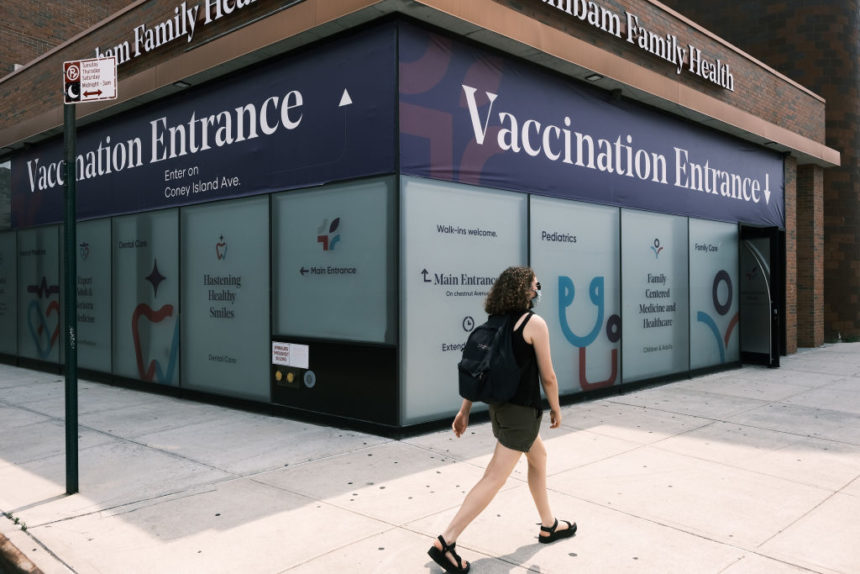Widespread vaccine mandates across both the public and private sectors have taken hold over the last few months — and by all accounts, they appear to be both popular and effective. Since President Biden’s announcement that the federal government would require government staffers and employees of government contractors to receive the shot, the U.S. has seen its vaccination rate, which had lagged following a quick start, nudge upward.
At the same time, a new, small wave of pushback against vaccine mandates has emerged. In Chicago and Los Angeles, groups of police officers and unions are vocally resisting the shot mandates. Some private employees are challenging mandates put in place by their companies. And Texas Governor Greg Abbott this week issued an executive order banning vaccine mandates altogether.
Whether challenges to the vaccine mandates will impact the larger vaccination campaign is yet to be seen. For one, the Occupational Safety and Health Administration, which plays a large role in defining federal policy, has yet to weigh in. Federal policy could clash with state laws. Then there’s the issue of how private companies will react.
“There are some question marks,” said Brian Dean Abramson, adjunct professor of vaccine law at Florida International University. “We don’t know what the interaction between state laws and the OSHA mandate will be, and we haven’t seen companies thread the needle of complying with both.”
Abramson said he expects legal conflicts over mandates to vary depending on location, as each state creates its own rules on top of the overarching federal law.
“We’re certainly seeing a range of state approaches, with some very aggressively mandating vaccination in a more robust way than the federal government is requiring,” he explained. “On the opposite end, you have states trying to enact broad exemptions to mandates or ban them, and you have companies trying to overcome that.”
Vaccine mandates aren’t exactly new. The country has mandated smallpox vaccination for school children, for instance, and required inoculations for healthcare workers. The difference this time around may be the scope of the COVID-19 mandates.
“We have seen vaccine mandates in the past, so many of the issues we are seeing and will see are issues we’ve seen before,” said Dorit Reiss, a professor at UC Hastings College of the Law. “What’s new is that we’re seeing it at such a broad scale.”
In some ways, the debate dates back to the birth of the country, when policy makers had to decide whether states could be their own laboratories of democracy and experience different outcomes. But overall, Reiss said, federal law tends to trump state law – and she expects most courts will favor the Biden administration’s scientific and public health safety guidelines.
“There might be the occasional judge who’s convinced to overturn the scientific expert recommendation, but I think that will be rare,” Reiss noted. “By and large, judges aren’t going to second-guess the science.”
A Texas bill aiming to prohibit employers from mandating vaccinations, for example, failed in the state legislature this week. Meanwhile, some Texas-based companies, such as Southwest Airlines, announced they would follow Biden’s federal rule rather than Governor Abbott’s executive order.
“What we’ve seen is there’s no appetite in the courts to throw out vaccination mandates generally,” Abramson said. “The cases that have challenged the mandates have all failed rather spectacularly at this point. The cases on the edge are the ones involving religious exemption, and we’re waiting to see how strongly religious exemptions or the right not to be vaccinated is read.”
In short, we can expect to see more lawsuits and legal conflicts over COVID-19 vaccine mandates in the future. But by and large, the majority of those lawsuits will probably have little impact on the greater vaccination war.
“Generally, vaccination mandates are going to be successful. They’re going to be upheld and they’re going to propel higher vaccination rates among the population that’s specifically targeted by those mandates,” Abramson said. “A lot of these cases may end up being resolved by the Supreme Court in favor of religious freedom, but not in an absolute sense. There will be a practical recognition by the court of the utility of vaccination, and a desire to frame things so that the bulk of the population ends up being vaccinated and exemptions remain exemptions.”
Reiss agreed that pockets of people who resist mandates or seek exemptions – whether or not they truly qualify for them — will remain, and she similarly expects some lawsuits in that arena to succeed. She still believes that addressing deeper fears among the vaccine-hesitant remains the best way for companies to address the issue.
“Non-vaccination comes in different flavors,” she explained. “Some people aren’t vaccinating because of things they read online and some people aren’t vaccinating because they have decades of very good reason to distrust the government. When we tailor our response, we should probably take the flavor of resistance into account for the specific workplace.”








